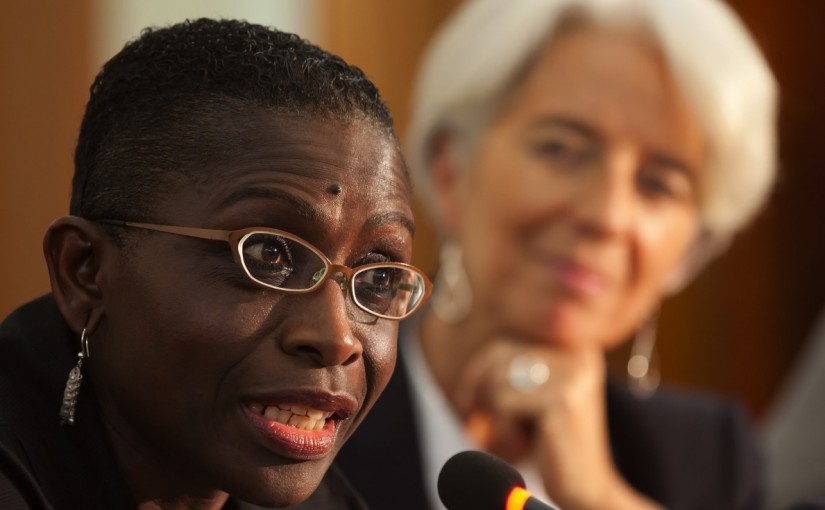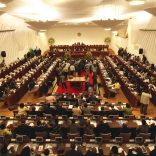Mozambique asks the EU to resume direct support for the budget suspended in 2016
IMF was complacent and patronizing towards Mozambique’s govt “financial delusions” – António Francisco

File photo / Antoinette Sayeh (L) Director of the IMF's African Department and Christine Lagarde (R) Managing Director of the International Monetary Fund
Mozambican researcher and economist Antonio Francisco believes that the International Monetary Fund (IMF) was complacent and patronizing towards the Mozambique government’s alleged “financial delusions” in recent years right up until the moment it found out that the country had hidden hefty debts, reports Lusa.
“If the Mozambican government is at present one of the worst cases of concealment and distortion of information that the IMF has faced in Africa, I hope this incident motivates it to be less complacent and patronizing towards Mozambican rulers,” the Institute of Social and Economic Studies of Mozambique (IESE) researcher says.
Faced with the doubts raised by Mozambican economic researchers over time, the IMF must have been wearing rose-coloured spectacles in order to describe the growth of the economy as “robust” and “sustainable,” he claims.
“I look forward to forthcoming IMF assessments. In fact, many people will be waiting with anxiety and curiosity, for a number of reasons,” Francisco said.
In 2002, at the height of Mozambique’s “financial delirium”, former President Armando Guebuza boasted: “We’re no longer a country that is talked about, but a country with whom you talk,” Francisco continues.
Now, the recent discovery of debts hidden by Guebuza’s government has worsened the risks and uncertainties significantly, and internationally, Mozambique has become an object of “disrepute and ridicule.”
“We do not know how other international government partners will react to recent revelations, but I suspect they are breathing a sigh of relief, because before, the IMF was too distracted and complacent. I hope that they react with a sense of responsibility towards Mozambican society but without complacency and indulgence towards the government,” he says.
The risk of social tension, Francisco says, will depend a lot on how the government manages the crisis. “If you react irresponsibly, breaking your word and continuing to say that the problem was caused by the global crisis, then we must expect social tension.”
In late March, the Wall Street Journal reported a US$622 million loan to the state company Proindicus, contracted in 2013 through banks Credit Suisse and Russia’s VTB, with an option to increase the value to US$900 million after one year.
On Tuesday, the Financial Times revealed that the government of Mozambique approved another loan of US$500 million to a public company.
On Tuesday, the Mozambican prime minister met the director general of the IMF, Christine Lagarde, and, according to a statement released after the meeting, recognized the existence of more than US$1 billion dollars of Mozambican external debt that had not been declared.
For the IMF, this was “an important first step”, to be followed by further information and documentation by the Mozambican government so as to “establish the facts and allow the Fund to make a full evaluation” and “identify steps to restore confidence”.
The IMF cancelled a planned mission to Mozambique last week due to disclosures about alleged hidden loans, and suspended the payment of the second installment of a loan to the Mozambican government.
On Saturday, the World Bank director for Mozambique told Lusa that the revelation of a new loan under the Ematum case may increase the risk of excessive debt and affect resources provided by the institution in the future.
The Mozambican prime minister said on Thursday that the meetings with the IMF and World Bank and US officials in Washington on government debt of Mozambique produced “encouraging results” and called for people to remain calm.
“Soon, the government will share officially, through appropriate channels, the results of this mission. But I am pleased to report that so far the meetings have produced encouraging results,” Prime Minister Carlos Agostinho do Rosario wrote on his Facebook page.
The ratio of the value of government debt to gross domestic product (GDP) increased from 42 percent in 2012 to 52 percent, 56.6 percent and 73.4 percent of the country’s wealth in the next three years.
“The total public debt [including domestic debt, external and guaranteed by the State] amounted to 56.6 percent of GDP in 2014 and is expected to reach 73.4 percent in 2015,” reads the confidential document that investors in Ematum bonds analyzed before deciding to exchange them for new sovereign debt securities last month.












Leave a Reply
Be the First to Comment!
You must be logged in to post a comment.
You must be logged in to post a comment.